Deck 2: Limits and Continuity
Question
Question
Question
Question
Question
Question
Question
Question
Question
Question
Question
Question
Question
Question
Question
Question
Question
Question
Question
Question
Question
Question
Question
Question
Question
Question
Question
Question
Question
Question
Question
Question
Question
Question
Question
Question
Question
Question
Question
Question
Question
Question
Question
Question
Question
Question
Question
Question
Question
Question
Question
Question
Question
Question
Question
Question
Question
Question
Question
Question
Question
Question
Question
Question
Question
Question
Question
Question
Question
Question
Question
Question
Question
Question
Question
Question
Question
Question
Question
Question

Unlock Deck
Sign up to unlock the cards in this deck!
Unlock Deck
Unlock Deck
1/125
Play
Full screen (f)
Deck 2: Limits and Continuity
1
For the function graphed below, identify  or state that the limit does not exist.
or state that the limit does not exist. 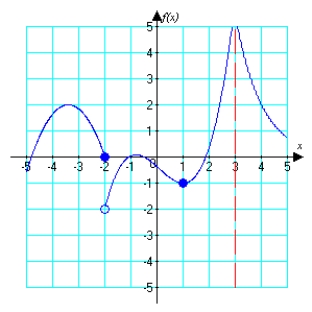
A) 0
B)
C)
D) does not exist
 or state that the limit does not exist.
or state that the limit does not exist. 
A) 0
B)

C)

D) does not exist
C
2
For the function graphed below, identify  or state that the limit does not exist.
or state that the limit does not exist. 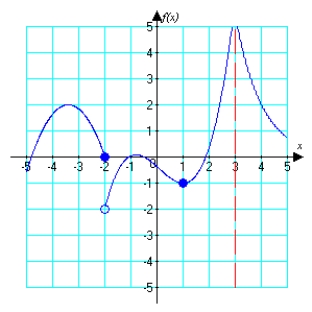
A) 0
B)
C)
D) does not exist
 or state that the limit does not exist.
or state that the limit does not exist. 
A) 0
B)

C)

D) does not exist
A
3
Estimate the slope of  at
at  .
.
A)
B)
C)
D)
 at
at  .
.A)

B)

C)

D)

D
4
Complete the tables appropriately and use the numerical evidence to conjecture the value of  .
. 

A) 0
B) -1
C) 1
D) -2
 .
. 

A) 0
B) -1
C) 1
D) -2

Unlock Deck
Unlock for access to all 125 flashcards in this deck.
Unlock Deck
k this deck
5
For the function graphed below, identify  or state that the limit does not exist.
or state that the limit does not exist. 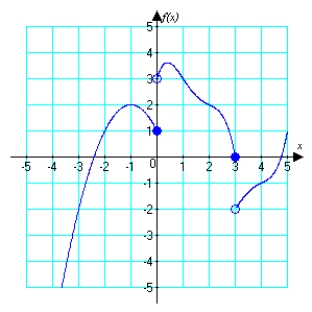
A) 1
B) 2
C) 3
D) does not exist
 or state that the limit does not exist.
or state that the limit does not exist. 
A) 1
B) 2
C) 3
D) does not exist

Unlock Deck
Unlock for access to all 125 flashcards in this deck.
Unlock Deck
k this deck
6
For the function graphed below, identify  or state that the limit does not exist.
or state that the limit does not exist. 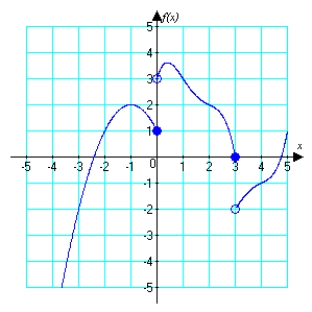
A) 0
B) 2
C)
D) does not exist
 or state that the limit does not exist.
or state that the limit does not exist. 
A) 0
B) 2
C)

D) does not exist

Unlock Deck
Unlock for access to all 125 flashcards in this deck.
Unlock Deck
k this deck
7
Estimate the slope of  at
at  .
.
A) 6
B) 3
C) 18
D) 9
 at
at  .
.A) 6
B) 3
C) 18
D) 9

Unlock Deck
Unlock for access to all 125 flashcards in this deck.
Unlock Deck
k this deck
8
Estimate the slope of  at
at  .
.
A)
B)
C)
D)
 at
at  .
.A)

B)

C)

D)


Unlock Deck
Unlock for access to all 125 flashcards in this deck.
Unlock Deck
k this deck
9
Estimate the length of the curve  on the interval
on the interval  using four line segments. Round the answer to 3 decimal places.
using four line segments. Round the answer to 3 decimal places.
A) 16.492
B) 8.000
C) 16.638
D) 16.000
 on the interval
on the interval  using four line segments. Round the answer to 3 decimal places.
using four line segments. Round the answer to 3 decimal places.A) 16.492
B) 8.000
C) 16.638
D) 16.000

Unlock Deck
Unlock for access to all 125 flashcards in this deck.
Unlock Deck
k this deck
10
Complete the tables appropriately and use the numerical evidence to conjecture the value of  .
. 

A) 0
B) 5
C) -20
D) 12
 .
. 

A) 0
B) 5
C) -20
D) 12

Unlock Deck
Unlock for access to all 125 flashcards in this deck.
Unlock Deck
k this deck
11
For the function graphed below, identify  or state that the limit does not exist.
or state that the limit does not exist. 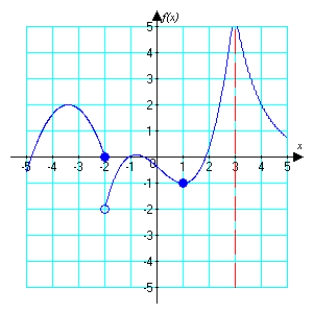
A) 0
B)
C)
D) does not exist
 or state that the limit does not exist.
or state that the limit does not exist. 
A) 0
B)

C)

D) does not exist

Unlock Deck
Unlock for access to all 125 flashcards in this deck.
Unlock Deck
k this deck
12
Estimate the length of the curve  on the interval
on the interval  using three line segments. Round the answer to 3 decimal places.
using three line segments. Round the answer to 3 decimal places.
A) 3.464
B) 3.518
C) 1.732
D) 0.577
 on the interval
on the interval  using three line segments. Round the answer to 3 decimal places.
using three line segments. Round the answer to 3 decimal places.A) 3.464
B) 3.518
C) 1.732
D) 0.577

Unlock Deck
Unlock for access to all 125 flashcards in this deck.
Unlock Deck
k this deck
13
For the function graphed below, identify  or state that the limit does not exist.
or state that the limit does not exist. 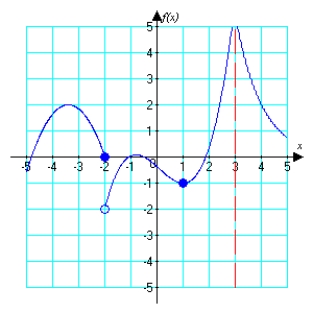
A) 0
B)
C)
D) does not exist
 or state that the limit does not exist.
or state that the limit does not exist. 
A) 0
B)

C)

D) does not exist

Unlock Deck
Unlock for access to all 125 flashcards in this deck.
Unlock Deck
k this deck
14
Estimate the slope of  at
at  .
.
A)
B)
C)
D)
 at
at  .
.A)

B)

C)

D)


Unlock Deck
Unlock for access to all 125 flashcards in this deck.
Unlock Deck
k this deck
15
For the function graphed below, identify  or state that the limit does not exist.
or state that the limit does not exist. 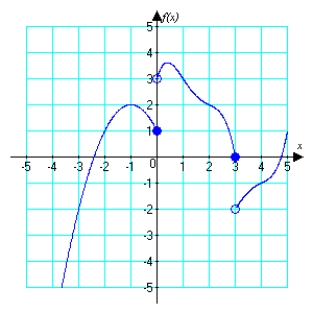
A) 0
B) 1
C) 3
D) does not exist
 or state that the limit does not exist.
or state that the limit does not exist. 
A) 0
B) 1
C) 3
D) does not exist

Unlock Deck
Unlock for access to all 125 flashcards in this deck.
Unlock Deck
k this deck
16
Sketch the graph of  . What is
. What is  ?
? 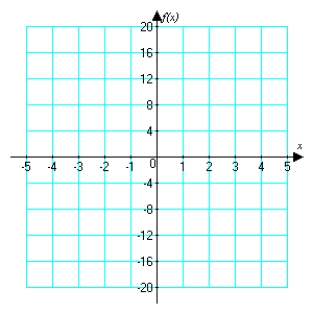
A)
B)
C)
D) does not exist
 . What is
. What is  ?
? 
A)

B)

C)

D) does not exist

Unlock Deck
Unlock for access to all 125 flashcards in this deck.
Unlock Deck
k this deck
17
Estimate the slope of  at
at  .
.
A) -2.00
B) 0.00
C) 1.00
D) 1.41
 at
at  .
.A) -2.00
B) 0.00
C) 1.00
D) 1.41

Unlock Deck
Unlock for access to all 125 flashcards in this deck.
Unlock Deck
k this deck
18
Estimate the slope of  at
at  .
.
A)
B)
C)
D)
 at
at  .
.A)

B)

C)

D)


Unlock Deck
Unlock for access to all 125 flashcards in this deck.
Unlock Deck
k this deck
19
For the function graphed below, identify  or state that the limit does not exist.
or state that the limit does not exist. 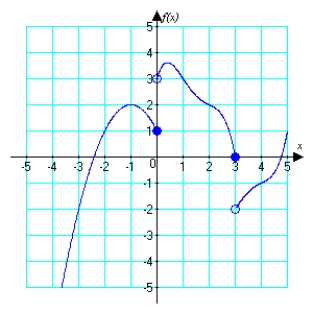
A) 0
B) 2
C)
D) does not exist
 or state that the limit does not exist.
or state that the limit does not exist. 
A) 0
B) 2
C)

D) does not exist

Unlock Deck
Unlock for access to all 125 flashcards in this deck.
Unlock Deck
k this deck
20
Sketch the graph of  . What is
. What is  ?
? 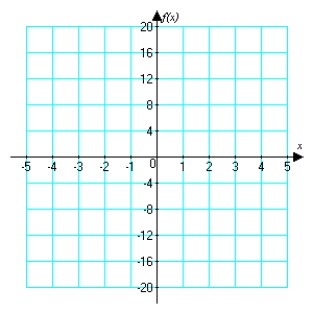
A)
B) 0
C) 5
D) does not exist
 . What is
. What is  ?
? 
A)

B) 0
C) 5
D) does not exist

Unlock Deck
Unlock for access to all 125 flashcards in this deck.
Unlock Deck
k this deck
21
Find the limit or explain why it does not exist. 
A)
B)
C)
D) The limit does not exist; the function is not defined for .
.

A)

B)

C)

D) The limit does not exist; the function is not defined for
 .
.
Unlock Deck
Unlock for access to all 125 flashcards in this deck.
Unlock Deck
k this deck
22
Use graphical and numerical evidence to determine if  exists. If so, state the limit.
exists. If so, state the limit.
A) the limit exists and is at
at 
B) the limit exists and is 0 at
C) does not exist; the right and left limits at are different
are different
D) does not exist; the function is increasing without bound at
 exists. If so, state the limit.
exists. If so, state the limit.A) the limit exists and is
 at
at 
B) the limit exists and is 0 at

C) does not exist; the right and left limits at
 are different
are differentD) does not exist; the function is increasing without bound at


Unlock Deck
Unlock for access to all 125 flashcards in this deck.
Unlock Deck
k this deck
23
Use graphical and numerical evidence to determine if  exists. If so, state the limit.
exists. If so, state the limit.
A) The limit exists and is at
at  .
.
B) The limit exists and is at
at  .
.
C) The limit does not exist; the function is increasing without bound from the left and decreasing without bound from the right at .
.
D) The limit does not exist; the function is decreasing without bound from the left and decreasing without bound from the right at .
.
 exists. If so, state the limit.
exists. If so, state the limit.A) The limit exists and is
 at
at  .
.B) The limit exists and is
 at
at  .
.C) The limit does not exist; the function is increasing without bound from the left and decreasing without bound from the right at
 .
.D) The limit does not exist; the function is decreasing without bound from the left and decreasing without bound from the right at
 .
.
Unlock Deck
Unlock for access to all 125 flashcards in this deck.
Unlock Deck
k this deck
24
Evaluate the limit, if it exists. 
A)
B)
C)
D) does not exist

A)

B)

C)

D) does not exist

Unlock Deck
Unlock for access to all 125 flashcards in this deck.
Unlock Deck
k this deck
25
Find the limit or explain why it does not exist. 
A)
B)
C)
D) The limit does not exist; the function is not defined for .
.

A)

B)

C)

D) The limit does not exist; the function is not defined for
 .
.
Unlock Deck
Unlock for access to all 125 flashcards in this deck.
Unlock Deck
k this deck
26
Evaluate the limit, if it exists. 
A)
B)
C)
D) does not exist

A)

B)

C)

D) does not exist

Unlock Deck
Unlock for access to all 125 flashcards in this deck.
Unlock Deck
k this deck
27
Evaluate the limit, if it exists. 
A) 0
B)
C)
D) does not exist

A) 0
B)

C)

D) does not exist

Unlock Deck
Unlock for access to all 125 flashcards in this deck.
Unlock Deck
k this deck
28
Use graphical and numerical evidence to estimate the limit. 
A)
B) 0
C)
D)

A)

B) 0
C)

D)


Unlock Deck
Unlock for access to all 125 flashcards in this deck.
Unlock Deck
k this deck
29
Sketch the graph of a function with the given properties. 
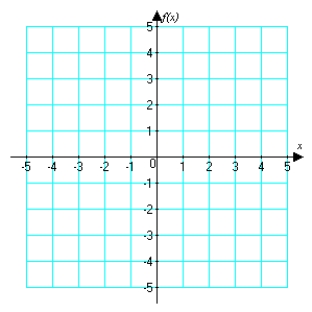



Unlock Deck
Unlock for access to all 125 flashcards in this deck.
Unlock Deck
k this deck
30
Sketch the graph of a function with the given properties. 
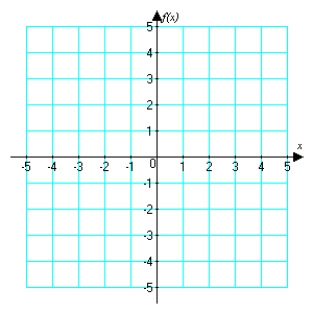



Unlock Deck
Unlock for access to all 125 flashcards in this deck.
Unlock Deck
k this deck
31
Evaluate the limit, if it exists. Assume that 

A) 0
B) 10
C)
D) The limit does not exist.


A) 0
B) 10
C)

D) The limit does not exist.

Unlock Deck
Unlock for access to all 125 flashcards in this deck.
Unlock Deck
k this deck
32
Use graphical and numerical evidence to determine if  exists. If so, state the limit.
exists. If so, state the limit.
A) The limit exists and is at
at  .
.
B) The limit exists and is at
at  .
.
C) The limit does not exist; the function is increasing without bound at .
.
D) The limit does not exist; the function is decreasing without bound at .
.
 exists. If so, state the limit.
exists. If so, state the limit.A) The limit exists and is
 at
at  .
.B) The limit exists and is
 at
at  .
.C) The limit does not exist; the function is increasing without bound at
 .
.D) The limit does not exist; the function is decreasing without bound at
 .
.
Unlock Deck
Unlock for access to all 125 flashcards in this deck.
Unlock Deck
k this deck
33
Use graphical and numerical evidence to determine if  exists. If so, state the limit.
exists. If so, state the limit.
A) The limit exists and is at
at  .
.
B) The limit exists and is at
at  .
.
C) The limit does not exist; the function is increasing without bound from the right at and is undefined for
and is undefined for  .
.
D) The limit does not exist; the function is decreasing without bound from the right at and is undefined for
and is undefined for  .
.
 exists. If so, state the limit.
exists. If so, state the limit.A) The limit exists and is
 at
at  .
.B) The limit exists and is
 at
at  .
.C) The limit does not exist; the function is increasing without bound from the right at
 and is undefined for
and is undefined for  .
.D) The limit does not exist; the function is decreasing without bound from the right at
 and is undefined for
and is undefined for  .
.
Unlock Deck
Unlock for access to all 125 flashcards in this deck.
Unlock Deck
k this deck
34
Evaluate the limit, if it exists. 
A)
B)
C) e
D) does not exist

A)

B)

C) e
D) does not exist

Unlock Deck
Unlock for access to all 125 flashcards in this deck.
Unlock Deck
k this deck
35
Use graphical and numerical evidence to estimate the limit. 
A)
B)
C)
D)

A)

B)

C)

D)


Unlock Deck
Unlock for access to all 125 flashcards in this deck.
Unlock Deck
k this deck
36
Use graphical and numerical evidence to estimate the limit. 
A) 0
B)
C)
D)

A) 0
B)

C)

D)


Unlock Deck
Unlock for access to all 125 flashcards in this deck.
Unlock Deck
k this deck
37
Evaluate the limit, if it exists. 
A) 0
B) 1
C)
D) does not exist

A) 0
B) 1
C)

D) does not exist

Unlock Deck
Unlock for access to all 125 flashcards in this deck.
Unlock Deck
k this deck
38
Find the limit or explain why it does not exist. 
A)
B)
C) The limit does not exist; the function increases without bound as x approaches 6 from the right.
D) The limit does not exist; the function is not defined for .
.

A)

B)

C) The limit does not exist; the function increases without bound as x approaches 6 from the right.
D) The limit does not exist; the function is not defined for
 .
.
Unlock Deck
Unlock for access to all 125 flashcards in this deck.
Unlock Deck
k this deck
39
A ski rental shop charges $6.00 for each hour, or portion of an hour, its ski equipment is rented for up to a maximum of $48.00 for all day. If  equals the total charge for the ski equipment for t hours, determine the limit
equals the total charge for the ski equipment for t hours, determine the limit  , if it exists.
, if it exists.
A) $15.00
B) $12.00
C) $18.00
D) The limit does not exist.
 equals the total charge for the ski equipment for t hours, determine the limit
equals the total charge for the ski equipment for t hours, determine the limit  , if it exists.
, if it exists.A) $15.00
B) $12.00
C) $18.00
D) The limit does not exist.

Unlock Deck
Unlock for access to all 125 flashcards in this deck.
Unlock Deck
k this deck
40
Evaluate the limit, if it exists. 
A)
B)
C)
D)

A)

B)

C)

D)


Unlock Deck
Unlock for access to all 125 flashcards in this deck.
Unlock Deck
k this deck
41
Complete the table appropriately and use the numerical evidence to conjecture the value of  .
. 
A) 0
B) 1
C) 3.5
D)
 .
. 
A) 0
B) 1
C) 3.5
D)


Unlock Deck
Unlock for access to all 125 flashcards in this deck.
Unlock Deck
k this deck
42
For the position function f(t)  (feet) find the instantaneous velocity at time
(feet) find the instantaneous velocity at time  seconds.
seconds.
A) feet per second
feet per second
B) feet per second
feet per second
C) feet per second
feet per second
D) feet per second
feet per second
 (feet) find the instantaneous velocity at time
(feet) find the instantaneous velocity at time  seconds.
seconds.A)
 feet per second
feet per secondB)
 feet per second
feet per secondC)
 feet per second
feet per secondD)
 feet per second
feet per second
Unlock Deck
Unlock for access to all 125 flashcards in this deck.
Unlock Deck
k this deck
43
Evaluate the limit, if it exists. 
A) 0
B) 8
C) 9
D) The limit does not exist.

A) 0
B) 8
C) 9
D) The limit does not exist.

Unlock Deck
Unlock for access to all 125 flashcards in this deck.
Unlock Deck
k this deck
44
Evaluate the limit, if it exists. 
A)
B)
C)
D) does not exist

A)

B)

C)

D) does not exist

Unlock Deck
Unlock for access to all 125 flashcards in this deck.
Unlock Deck
k this deck
45
Given  ,
,  and
and  , find
, find  .
.
A)
B)
C)
D) The limit does not exist.
 ,
,  and
and  , find
, find  .
.A)

B)

C)

D) The limit does not exist.

Unlock Deck
Unlock for access to all 125 flashcards in this deck.
Unlock Deck
k this deck
46
Find all discontinuities.  For each discontinuity that is removable, define a new function that removes the discontinuity.
For each discontinuity that is removable, define a new function that removes the discontinuity.
 For each discontinuity that is removable, define a new function that removes the discontinuity.
For each discontinuity that is removable, define a new function that removes the discontinuity.
Unlock Deck
Unlock for access to all 125 flashcards in this deck.
Unlock Deck
k this deck
47
Find all discontinuities. 
A) discontinuous at
B) discontinuous at
C) discontinuous at
D) continuous for all x

A) discontinuous at

B) discontinuous at

C) discontinuous at

D) continuous for all x

Unlock Deck
Unlock for access to all 125 flashcards in this deck.
Unlock Deck
k this deck
48
Given  and
and  , find
, find  .
.
A)
B)
C)
D) The limit does not exist.
 and
and  , find
, find  .
.A)

B)

C)

D) The limit does not exist.

Unlock Deck
Unlock for access to all 125 flashcards in this deck.
Unlock Deck
k this deck
49
Find all discontinuities. 
A) discontinuous at
B) discontinuous at
C) discontinuous at
D) continuous for all x

A) discontinuous at

B) discontinuous at

C) discontinuous at

D) continuous for all x

Unlock Deck
Unlock for access to all 125 flashcards in this deck.
Unlock Deck
k this deck
50
Given  and
and  , find
, find  .
.
A)
B)
C)
D)
 and
and  , find
, find  .
.A)

B)

C)

D)


Unlock Deck
Unlock for access to all 125 flashcards in this deck.
Unlock Deck
k this deck
51
Evaluate  where
where  .
.
A)
B)
C)
D) does not exist
 where
where  .
.A)

B)

C)

D) does not exist

Unlock Deck
Unlock for access to all 125 flashcards in this deck.
Unlock Deck
k this deck
52
Find all discontinuities. 
A) discontinuous at
B) discontinuous at
C) discontinuous at
D) continuous for all x

A) discontinuous at

B) discontinuous at

C) discontinuous at

D) continuous for all x

Unlock Deck
Unlock for access to all 125 flashcards in this deck.
Unlock Deck
k this deck
53
Given that  find the limit or explain why it does not exist.
find the limit or explain why it does not exist. 
A)
B)
C)
D) The limit does not exist; the function is not defined at .
.
 find the limit or explain why it does not exist.
find the limit or explain why it does not exist. 
A)

B)

C)

D) The limit does not exist; the function is not defined at
 .
.
Unlock Deck
Unlock for access to all 125 flashcards in this deck.
Unlock Deck
k this deck
54
Evaluate  where
where  .
.
A)
B)
C)
D) does not exist
 where
where  .
.A)

B)

C)

D) does not exist

Unlock Deck
Unlock for access to all 125 flashcards in this deck.
Unlock Deck
k this deck
55
Determine where  is continuous.
is continuous.
A)
B)
C)
D)
 is continuous.
is continuous.A)

B)

C)

D)


Unlock Deck
Unlock for access to all 125 flashcards in this deck.
Unlock Deck
k this deck
56
Evaluate the limit, if it exists. Assume that 

A) 0
B)
C)
D) The limit does not exist.


A) 0
B)

C)

D) The limit does not exist.

Unlock Deck
Unlock for access to all 125 flashcards in this deck.
Unlock Deck
k this deck
57
Evaluate the limit, if it exists. 
A)
B)
C)
D) does not exist

A)

B)

C)

D) does not exist

Unlock Deck
Unlock for access to all 125 flashcards in this deck.
Unlock Deck
k this deck
58
Suppose that a state's tax code states that tax liability is  % on the first
% on the first  of taxable earnings and
of taxable earnings and  % on the remainder. Find the constants a and b in the tax function T(x)
% on the remainder. Find the constants a and b in the tax function T(x)  such that
such that  and
and  exists.
exists.
A) and
and 
B) and
and 
C) and
and 
D) and
and 
 % on the first
% on the first  of taxable earnings and
of taxable earnings and  % on the remainder. Find the constants a and b in the tax function T(x)
% on the remainder. Find the constants a and b in the tax function T(x)  such that
such that  and
and  exists.
exists.A)
 and
and 
B)
 and
and 
C)
 and
and 
D)
 and
and 

Unlock Deck
Unlock for access to all 125 flashcards in this deck.
Unlock Deck
k this deck
59
Evaluate the limit, if it exists. 
A)
B)
C)
D) does not exist

A)

B)

C)

D) does not exist

Unlock Deck
Unlock for access to all 125 flashcards in this deck.
Unlock Deck
k this deck
60
For the position function f(t)  (feet) find the instantaneous velocity at time
(feet) find the instantaneous velocity at time  seconds.
seconds.
A) feet per second
feet per second
B) feet per second
feet per second
C) feet per second
feet per second
D) feet per second
feet per second
 (feet) find the instantaneous velocity at time
(feet) find the instantaneous velocity at time  seconds.
seconds.A)
 feet per second
feet per secondB)
 feet per second
feet per secondC)
 feet per second
feet per secondD)
 feet per second
feet per second
Unlock Deck
Unlock for access to all 125 flashcards in this deck.
Unlock Deck
k this deck
61
Determine if f is continuous at  from the right.
from the right. 
A) but
but  is continuous from the right
is continuous from the right
B) so
so  is continuous from the right
is continuous from the right
C) so
so  is not continuous from the right
is not continuous from the right
D) but
but  is not continuous from the right
is not continuous from the right
 from the right.
from the right. 
A)
 but
but  is continuous from the right
is continuous from the rightB)
 so
so  is continuous from the right
is continuous from the rightC)
 so
so  is not continuous from the right
is not continuous from the rightD)
 but
but  is not continuous from the right
is not continuous from the right
Unlock Deck
Unlock for access to all 125 flashcards in this deck.
Unlock Deck
k this deck
62
Determine the intervals where f is continuous. 
A)
B)
C)
D)

A)

B)

C)

D)


Unlock Deck
Unlock for access to all 125 flashcards in this deck.
Unlock Deck
k this deck
63
Determine the values of a and b that make f(x) continuous. 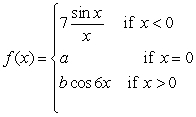 Use
Use  .
.
A)
B)
C)
D) No values of a and b will make f(x) continuous.
 Use
Use  .
.A)

B)

C)

D) No values of a and b will make f(x) continuous.

Unlock Deck
Unlock for access to all 125 flashcards in this deck.
Unlock Deck
k this deck
64
Suppose that a state's tax code states that tax liability is  % on the first
% on the first  of taxable earnings and
of taxable earnings and  % on the remainder. Find the constants a and b in the tax function T(x) that make the function T(x) continuous.
% on the remainder. Find the constants a and b in the tax function T(x) that make the function T(x) continuous. 
A) and
and 
B) and
and 
C) and
and 
D) and
and 
 % on the first
% on the first  of taxable earnings and
of taxable earnings and  % on the remainder. Find the constants a and b in the tax function T(x) that make the function T(x) continuous.
% on the remainder. Find the constants a and b in the tax function T(x) that make the function T(x) continuous. 
A)
 and
and 
B)
 and
and 
C)
 and
and 
D)
 and
and 

Unlock Deck
Unlock for access to all 125 flashcards in this deck.
Unlock Deck
k this deck
65
Determine the limit.  Answer with a number,
Answer with a number,  ,
,  or that the limit does not exist.
or that the limit does not exist.
A)
B)
C) 0
D) 16
E) The limit does not exist.
 Answer with a number,
Answer with a number,  ,
,  or that the limit does not exist.
or that the limit does not exist.A)

B)

C) 0
D) 16
E) The limit does not exist.

Unlock Deck
Unlock for access to all 125 flashcards in this deck.
Unlock Deck
k this deck
66
Determine the intervals where f is continuous. 
A)
B)
C)
D)

A)

B)

C)

D)


Unlock Deck
Unlock for access to all 125 flashcards in this deck.
Unlock Deck
k this deck
67
Determine if f is continuous at  from the right.
from the right. 
A) , but
, but  is continuous from the right
is continuous from the right
B) , so
, so  is continuous from the right
is continuous from the right
C) , so
, so  is not continuous from the right
is not continuous from the right
D) , but
, but  is not continuous from the right
is not continuous from the right
 from the right.
from the right. 
A)
 , but
, but  is continuous from the right
is continuous from the rightB)
 , so
, so  is continuous from the right
is continuous from the rightC)
 , so
, so  is not continuous from the right
is not continuous from the rightD)
 , but
, but  is not continuous from the right
is not continuous from the right
Unlock Deck
Unlock for access to all 125 flashcards in this deck.
Unlock Deck
k this deck
68
Explain why the function fails to be continuous at  by indicating which of the conditions in the definition of continuity are not met.
by indicating which of the conditions in the definition of continuity are not met. 
A) exists but
exists but  does not exist
does not exist
B) exists but
exists but  does not exist
does not exist
C) neither nor
nor  exist
exist
D) exists and
exists and  exists but
exists but 
 by indicating which of the conditions in the definition of continuity are not met.
by indicating which of the conditions in the definition of continuity are not met. 
A)
 exists but
exists but  does not exist
does not existB)
 exists but
exists but  does not exist
does not existC) neither
 nor
nor  exist
existD)
 exists and
exists and  exists but
exists but 

Unlock Deck
Unlock for access to all 125 flashcards in this deck.
Unlock Deck
k this deck
69
Determine the values of a and b that make f(x) continuous. 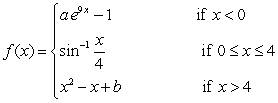
A)
B)
C)
D) No values of a and b will make f(x) continuous.

A)

B)

C)

D) No values of a and b will make f(x) continuous.

Unlock Deck
Unlock for access to all 125 flashcards in this deck.
Unlock Deck
k this deck
70
Use the graph to identify all discontinuities f. 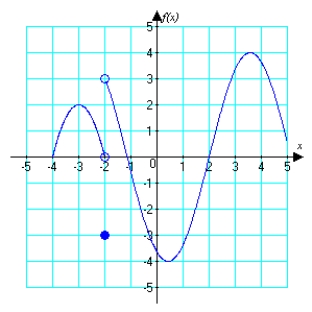


Unlock Deck
Unlock for access to all 125 flashcards in this deck.
Unlock Deck
k this deck
71
Determine the intervals where f is continuous. 
A)
B)
C)
D)

A)

B)

C)

D)


Unlock Deck
Unlock for access to all 125 flashcards in this deck.
Unlock Deck
k this deck
72
Use the graph to identify all discontinuities of f. 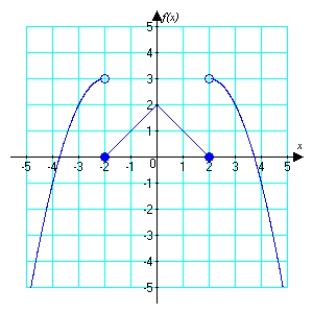


Unlock Deck
Unlock for access to all 125 flashcards in this deck.
Unlock Deck
k this deck
73
Determine the intervals on which  is continuous.
is continuous. 
A)
B)
C)
D)
 is continuous.
is continuous. 
A)

B)

C)

D)


Unlock Deck
Unlock for access to all 125 flashcards in this deck.
Unlock Deck
k this deck
74
Use the Intermediate Value Theorem to determine if f has a zero in the interval [3,8]. ![Use the Intermediate Value Theorem to determine if f has a zero in the interval [3,8].](https://storage.examlex.com/TB2342/11eaa948_cdd0_47e1_84bc_59608c03beec_TB2342_11.jpg)
![Use the Intermediate Value Theorem to determine if f has a zero in the interval [3,8].](https://storage.examlex.com/TB2342/11eaa948_cdd0_47e1_84bc_59608c03beec_TB2342_11.jpg)

Unlock Deck
Unlock for access to all 125 flashcards in this deck.
Unlock Deck
k this deck
75
Use the graph to identify all discontinuities of f. 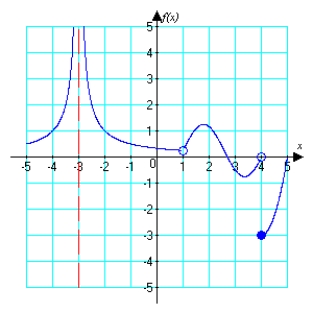


Unlock Deck
Unlock for access to all 125 flashcards in this deck.
Unlock Deck
k this deck
76
Use the graph to identify all discontinuities of f. 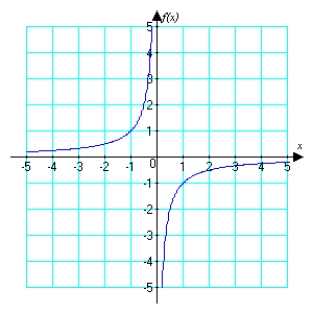


Unlock Deck
Unlock for access to all 125 flashcards in this deck.
Unlock Deck
k this deck
77
Determine the intervals on which  is continuous.
is continuous. 
A)
B)
C)
D)
 is continuous.
is continuous. 
A)

B)

C)

D)


Unlock Deck
Unlock for access to all 125 flashcards in this deck.
Unlock Deck
k this deck
78
Determine the intervals where f is continuous. 
A)
B)
C)
D)

A)

B)

C)

D)


Unlock Deck
Unlock for access to all 125 flashcards in this deck.
Unlock Deck
k this deck
79
Use the Intermediate Value Theorem to determine if f has a zero in the interval [3, 9]. ![Use the Intermediate Value Theorem to determine if f has a zero in the interval [3, 9].](https://storage.examlex.com/TB2342/11eaa948_cdd0_47e2_84bc_65b15c283937_TB2342_11.jpg)
![Use the Intermediate Value Theorem to determine if f has a zero in the interval [3, 9].](https://storage.examlex.com/TB2342/11eaa948_cdd0_47e2_84bc_65b15c283937_TB2342_11.jpg)

Unlock Deck
Unlock for access to all 125 flashcards in this deck.
Unlock Deck
k this deck
80
Find all discontinuities. 
A) discontinuous at
B) discontinuous at
C) discontinuous at
D) continuous for all x

A) discontinuous at

B) discontinuous at

C) discontinuous at

D) continuous for all x

Unlock Deck
Unlock for access to all 125 flashcards in this deck.
Unlock Deck
k this deck


